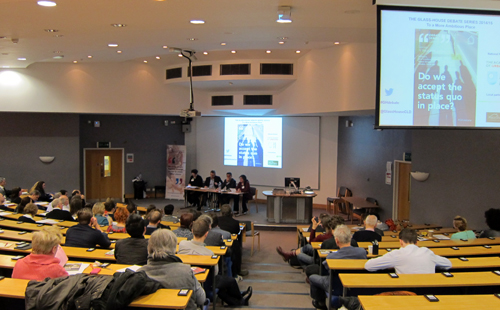Written by:
“We are both too ambitious and not ambitious enough” opened our first speaker, Alastair Donald on Wednesday at our fourth and final debate in this year’s Series To a More Ambitious Place. The British Council Director for the British Pavilion at the Venice Architecture Biennale told us firmly that design in placemaking was suffering from “mission creep”, by embracing the doctrine of “salvation by brick” and entering the realm of social engineering. By doing so, designers have lost ambition to drive design solutions that can “accommodate” the choices people want to make. Our other two speakers – Andrew Carter of Centre for Cities and Leslie Barson of the London Community Housing Co-operative, also questioned our ambitions for places. Andrew was clear that it is self-determinism and not the state that will encourage ambition, and innovation. Whilst Leslie questioned carefully the nature of ambition – is it always good? “We should use our ambitions to help the not powerful”, she declared, to a receptive room, “it doesn’t matter how much we demand if we demand the wrong things.”
Our debate quickly moved into a discussion of democracy and the politics of place. Andrew critiqued a bland and neutral “average policy that drives out innovation and experimentation”. His solution? Decentralisation. But not all the audience (in the room and on twitter) were convinced this was the magic wand we need, citing amongst other things, London as an example of devolution that hasn’t worked for place. We debated the merits of governing authorities in creating great places and some in the room felt rules and regulation did make for a pleasant status quo. Stronger were the voices calling for less managerialism (which they argued was often undemocratic) and for an approach led by the community.
And what of communities? Leslie argued they were priced out of place by the cost of land and the power of the “elite” – we are “playthings in a game, the rules of which we often don’t even understand and have had no part in making”, she stated, “The city isn’t for people – it’s for investment”. We talked economics and the role of cities in our national economy, but our audience also reflected on the human cost of the status quo. We heard the stories of people ground down by inadequate engagement processes that made taking ownership in a place feel like a battle. Placemaking can take an “emotional toll” on communities engaging in these processes said one audience member, another told us “I feel beaten down by having to engage on so many levels to achieve something”.
Yet, all our three speakers, with supportive nods and noises from the audience, agreed that people deferring responsibility to the state undermined our capacity to work as real communities. We addressed the role of individual agency and its influence on placemaking and communities: “Leadership by a community makes power disperse and diffuse” Leslie told us. Alastair argued that the primary issue was not matters like the privatisation of public space and ownership in this way, but a more fundamental question of our culture. We have “undermined” individual autonomy and have become more “suspicious of fellow citizens”. To regain a sense of the city “we need ambiguity, tolerance and citizenship” he concluded. Andrew asked the room “who is going to be the maker of change?” and it was clear that Leslie’s comment that when she got frustrated by the system that she “just did something” resonated in the room.
Have we accepted the status quo? Clearly many in our audience are and have been battling it. Yet it seems we agreed that we have as a community taken a back seat at times – leaving things to someone else. If we want places to change, our speakers, and audience, sounded a call for us to stand up and challenge the status quo. Taking a very small daily example of how we accept what’s happening and don’t take responsibility, Andrew told us: “Next time someone on the bus has their headphones on too loud, ask them to turn them down.” Then – maybe next time things will be different.
This was the final Debate in our 2014/15 Series. To a More Ambitious Place explored the barriers to realising our ambitions for great places in four cities; Glasgow, Sheffield, Bristol and London.
We are currently preparing our 2015/16 Debate Series. if you would like to contribute as a sponsor, partner or speaker or would like to share thoughts on the possible content, email our Marketing and Events Manager, Lucia das Neves

